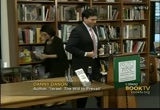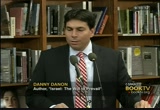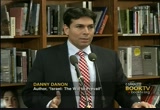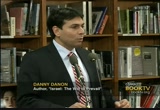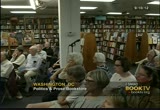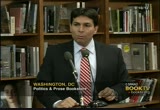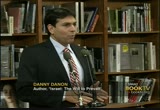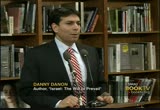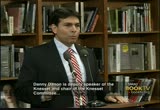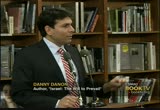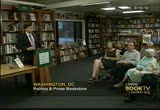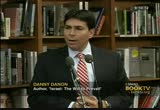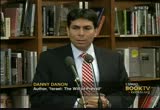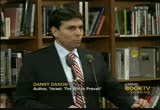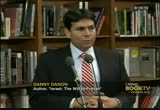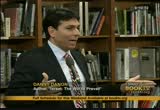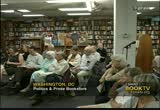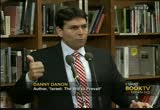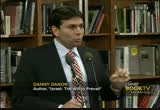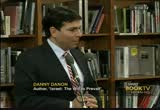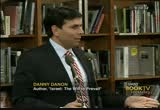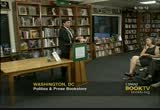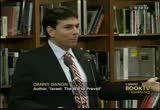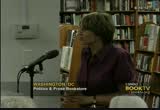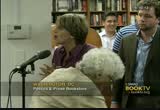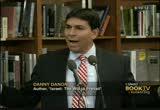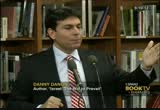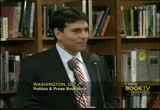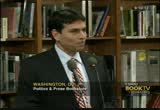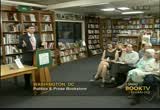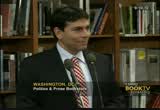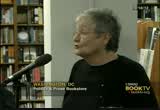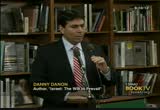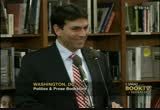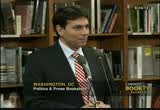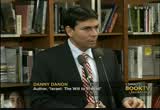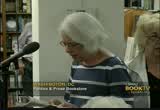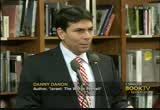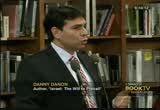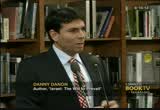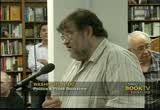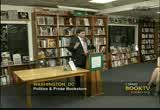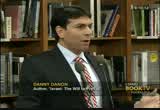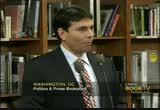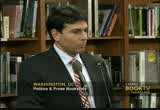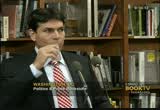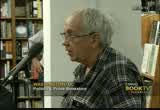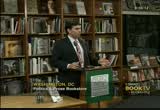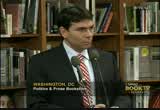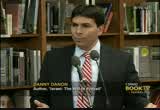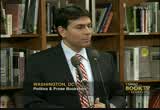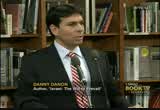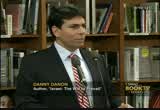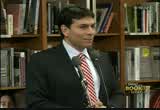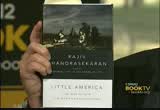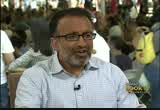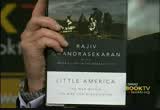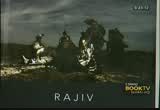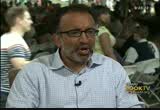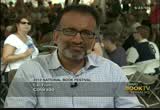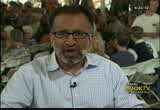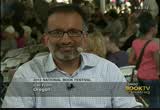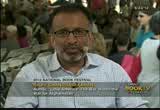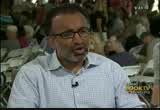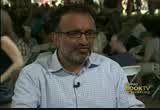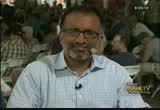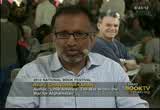tv Book TV CSPAN September 30, 2012 3:45pm-5:00pm EDT
3:45 pm
speak? >> i did. >> how was it? >> it was fantastic. he puts et into a context that you can understand. >> it was a book you want today read before you came today, or were you inspired to read it after you saw him? >> actually, i read it before today, and he's got a new book out that i'll be picking up. >> any other books you recommend to people? >> i just finished the recent game of thereons book -- thrones books. >> what are you currently reading now? >> i'm going to be picking up the oath, that's going to be my book for, i guess, the next couple weeks. >> next on booktv, danny danon argues israel will never reach its foreign policy goals while under the wing of the united states which he says count always have israel's -- doesn't always have israel's best interests at heart. this is just under an hour. [applause]
3:46 pm
>> shalom, good evening, everybody. it is my pleasure to be here with you, especially when you have such great weather in washington. almost like jerusalem at this time of the year. i am very happy to see so many people coming and showing an interest in my book, and i would like in the next 20 minutes to share with you not what you're going to read in the book, but what's behind the ideas. but first i want to think we all can agree that's what's happening in israel is important to the people who live in the united states of america. why? because we share the same values, the same principles, the same heritage and the same enemies. and because we are in the middle east today being attacked, so you have to ask yourself why those people are against the jewish nation in the middle east. the arab against israel not because of the land that we so-called occupied.
3:47 pm
we are being attacked because of the values that we are walking upon them in israel. and the values are democracy. we are following very carefully the elections here in the united states. and it's getting to be interested. i can tell you in the last three weeks it's become more interesting. but we do follow it, and we do love the american people and t american values. sometimes too much. for example, in the day of independence in israel, which is a big celebration in may, you will find people putting the israeli flag and the american flag. i don't like it. why people do it, because they do it because of the value and democracy of the american people. but one of my main points in my book is that israel is not america. even though we love america, we are not muck, and -- america, and we are not america because we cannot make a mistake.
3:48 pm
if israel makes mistakes, we cannot correct it. and we saw it in the past. and my main point in my book, that evil must take the decisions according to the interest of israel period, we do not have to think or to try to satisfy anyone even if it means telling to our allies to have the american president to the u.n., we do not agree with you. and i will give you two examples. we are all -- and i'm going to deal with the issue of iran. it will be the first question. before iran, let's speak iraq. in the early '80s, the prime minister decided to attack the nuclear reactor in iraq. it wasn't popular here in the u.s., but we did it. and we we were condemned by the u.s., by the state department, we were condemned by the u.n., but years later people exearkted that the -- appreciated that
3:49 pm
the, grave decision that prime minister begin took in 198 is 1 was for the benefit of the american people. because when you, the american army, invaded iraq, you were able do into the region without taking the risk that iran was nuclear. i'm sure there are some young jewish people in the audience, and for us, i don't mean -- yom kippur is the holiest day of the year. 1973 during the yom kippur, that's something i found out even though i thought i knew everything before i wrote the book, but while doing the research, i learned myself a lot, and i found out that in 1973 when the egyptian and syrian armies caught us by surprise and we were almost in a point that we would have lost the war, and when we lose the war, you know where we can go to, to the sea. it's not that the war that you fight in vietnam or afghanistan.
3:50 pm
when we lose a war, it means that we're out of the game. and we've got to a crucial point in the first day of the war that we were invaded from both fronts, and from here in washington the state department sent out telegrams to the embassy which is not far away from him. and on that telegram, there was a message from kissinger telling us the israelis, wait, hold your horses. do not take action because kissinger is going to move on diplomatic efforts. by too tim the helicopter was sent, the egyptian and syrian armies were already on their way to destroy the jewish state.
3:51 pm
>> it's something that maybe one day there will be a committee to look at the decision in the u.n. but also invite the u.s., secretary clinton said only a few hours ago, we should not put any red lines to iran. when you deal with the enemies in the middle east, you don't play according to the rules of
3:52 pm
washington, d.c., jerusalem or vienna. it is a different ball game. it's a different language. if you want to work with somebody in iran to stop the nuclear race, you have to take action. and in my book i worried very directly that it is not enough to talk. we need to take action. and we have seen that sanctions are not crippling sanctions. and i think what happened the last month in the decision that our friend in canada took to close the embassy in tehran, it is a brave decision. we should have done it years ago. because the people in iran, they look at what's happening here. in two weeks' time, ahmadinejad will be traveling again to the u.s., he will go to the u.n., he will deliver a nice speech, but then he will go back to iran, and he will continue with the race to build that nuclear bomb. in my book i spoke a lot about israel, but it affects the well
3:53 pm
being of the american people. because if iran would become nuclear, it is a threat to you. maybe we are on the front line, maybe they will go after us first. but listen to what the people in iran are saying. they're saying it very clearly. we will wipe out israel first. then we want to wipe out the great -- [inaudible] the united states of america. and in the mosques they are saying it. we will go after the saturday people, the jews, but after that we will go after the sunday people, the christians. and they may try to send you a message. you have to wake up. you know, you have to say nimby, not in my backyard. and many americans say, well, it's not in my backyard -- but israel, why should we care? let me tell you something, it is in your backyard.
3:54 pm
because iran become nuclear, it is a threat to the american people. look at the linkage between hezbollah and al-qaeda. what is the connection between hezbollah and iran and venezuela why they work together? why there are weekly flights? one thing they have in common, the hatred of the shared values, to american values, israeli values, to what we represent. so if -- we all gonna remember the incident and the attack of 9/11. al-qaeda decided to attack the towers in new york city. they could have done it in the towers of tell aveef city. -- tel aviv state. they had the capability, and with all due respect to our
3:55 pm
intelligence and to our security systems, if al-qaeda had wanted to attack the towers in tel aviv, the israeli towers, they would have been able to do it. but they chose to attack here in the u.s., here in washington d.c. why? because they wanted to send a message, and for that matter, i hope that the united states of america and whoever will be elected will take a leadership decision and a moral decision. maybe it's not popular, but it will be a moral decision to stop the nuclear race in iran today. and i don't know how many of you have followed the wikileaks reports and what was written there, but something very interesting popped up on the report of wikileaks. when you go and you look at the writing of the arab leaders -- not israelis, not jewish, arab leaders in the middle east, they are afraid from iran becoming nuclear more than us. the people in saudi arabia, in
3:56 pm
egypt, in jordan. so if that matter i think we will have to take action, and if the u.s. will decide to sit idly by and to watch and to pray to take action, israel will have to do it by itself. it will not be easy, it will be harder, there will be retaliation not only from iran, there will be missiles flying in from iran, from lebanon, the hezbollah will join the party, the hamas organization in gads saw will -- gaza will send hundreds of missiles. but if we have to choose today between the option of allowing iran to become nuclear to the option of fighting ourselves, i think it is a clear message what we will do. and the question e is if we will do it with the u.s. or without the u.s. it's what we are asking today. one of the main points of my
3:57 pm
book and i know many people are involved in a two-state solution. for the last 20 years we hear about two-state solution. you must finish the conflict. top the palestinian -- to be the palestinian state and go back to the 1967 lines. and in my book, i prevent a new paradigm. enough of the two-state solution. it doesn't work. we have tried it for the last 20 years. we haven't received any peace. we tried it with engagement from gaza, it didn't help us as well. and i think that in the long run there should be a three-state solution, not two-state solution. and when i speak about three-state solution, i speak about jordan, egypt and israel.
3:58 pm
i do not believe there should be a palestinian state in the land of sumeria because look what's happening today in gaza. what is becoming wing of iran. a wing of islamic radical forces. and you ask yourself, do you want to see the same happening in jerusalem? i do not. and in my book i have a lot of criticism regarding the current administration, but there are some good decisions. and the decision to eliminate osama bin laden, i think it was leadership in action when president obama decided to kill osama bin laden. and he did the right thing ordering the troops to do it. but 24 hours later there was one leader that condemned the u.s.
3:59 pm
for killing one of the greatest leader. do you know who was that leader which condemned the americans? it was the leader of the hamas organization in gaza. he was the only one who say i'm condemning the u.s. for killing a great hero of the arab nation. and on the other end, while sending the troops to kill osama bin laden, the american administration is pressuring israel to sit down and negotiate. but with whom? with the same people who praised osama bin laden? with the same people who teach and incite against jews every day? that is why i think that if we need to get to a point after which we have a decision, we cannot allow the palestinian state. also i don't know how many of you have been to israel, but to get from my hotel to here is almost crossing israel from east to west. the proximity issue is very
4:00 pm
important, and building an entity of -- [inaudible] backing out, it's not something we can allow. and it's not like you when you say, well, we have a border with canada, with mexico. if we have a border with an enemy state or enemy entity, look what's happening today in israel. prime minister sharon decided to pull out from gaza. i was against it, and in my book i write about my personal experiences because i was very close to prime minister sharon until the point he decided to disengage from gaza. he was the god godfather of my first son, and i approached him, i told him, mr. sharon, you know how much i supported you and helped you to become the prime minister, but the minute you decided to pull out, take jews out of their communities, i cannot work with you anymore politically. and he took that decision. ..
4:02 pm
>> with president obama tonight, we will have to come here to washington dc and tell him, no, we cannot. we cannot do what you want. because it is much deeper than what we are willing to give. the conflict is about the variants in resistance to israel. when we talk with palestinian leaders, we understand -- [inaudible] we don't want to see jews living in the middle east. i do not want to change language that we speak regarding israel. in the book, i put in a new part to change the language for you. i'm talking in my book about our
4:03 pm
rights. we have rights in israel. starting with the biblical rights and christians and jews alike, the connection of jews to the land. for me it is enough, but for those of you that it is not enough, i am talking about the historical rights. i go back to the book by mark twain in the show historically the connection between jews and israel. just like the connection of palestinians to israel. i am talking about their legal rights and i am sure there are some law students in the room. when you read the book and the legal documents about the declaration, you understand about legal advice and international, finding, legal rights to jews and the rights to
4:04 pm
the land. i call this the common sense rights. [inaudible] this side was aggressive and started the war in and saying, you know, above my land back, -- even in the united states, nobody comes and tells you that we want our land back after we lost the war. the common sense rights should be something that should be said straightly. it enables us to espouse another role. [inaudible] if you lose, you lose. i've been talking about the rights about something very important, many times because of the pressure, coming from
4:05 pm
washington and the u.s., we tend not to speak about what belongs to us and what we believe, and i chose the name of the book "isreal: the will to prevail" because i think it is all about us. if we have the will to live, the will and the courage of the nation, we would be able to prevail. if we would try to satisfy everybody, all the time, we will not be able to win. we live in a beautiful land, and i know every time i speak, it sounds like we have so many enemies in so much trouble. israel is a beautiful country of innovation. whether you like israel or don't like israel, it is a country that is a beauty.
4:06 pm
israel is a great place to live. also to bring your family. we need to stand up and protect ourselves until we get to a point that we have a viable ability to use each about a peaceable agreement. that is why i speak in my book about complex management, not conflict resolution. we have too many photo ops and too many signs -- big supporters of the environment --
4:07 pm
[inaudible] thousands of faces, [inaudible] for example, a tomb that is a holy site for jews. jews are supposed to go there whenever they want to pray, but we cannot go there. the jews cannot go there and pray at the tomb. i don't want to have another call or ceremony at the white house, i want to get to the point where we can -- until we get to that point -- we need to manage the conflict. i would like to sum up until you that the book is very straight. i did not hide in some of my colleagues told me, danny
4:08 pm
dannon, you are making a mistake because if you write something now and you are relatively young, what will happen in a few years? people will tell you that you did this or that on page 182, and now, what are you doing? i told them i believe in the principles and i am able to protect them, and that one day if i see the was wrong, i will come and say so. but so far, what we have seen is that the public of israel and the american people are understanding. it is not about what israel is willing to [inaudible] i want to thank you all for coming here tonight. i will be very happy to answer questions. you came ready to answer questions. i am very happy to answer questions. thank you very much. [applause]
4:09 pm
>> yes, i have two questions. don't you think it's kind of talk to you are giving tonight is encouraging the extremists in the muslim world who wanted to destroy israel? for two reasons, the first as there is a struggle going on between the moderates and the extremists, between hamas and the palestinian authorities. the kind of action that you are talking about now encourages the forces of hamas. like you, hamas does not believe in diplomacy. like you, hamas believes in strength and they don't want to negotiate in the white house. what you are doing is talking to the people who say that it is not worth it to talk to israel and you are discouraging the palestinians -- you are discouraging them and you're going to take the swing votes among the palestinians and you are pushing them towards hamas. doesn't that bother you or don't you feel guilty? that is the first question. [laughter] but second question is there are a lot of forces in the world. israel needs friends in the world. don't you think they would gain
4:10 pm
more friends considering how dangerous a rawness. i completely agree with you how dangerous they are. wouldn't you gain more friends of peace.getting upset -- getting your people upset. >> i do not feel guilty. i think it's very important and speak up and say what it's worth -- [inaudible name] he signed an agreement with hamas. he decided to walk together with hamas. he cannot come today and ask the israelis and say, well, i am part of the radical forces. unfortunately, today you see that he cannot go into gaza.if , nobody could guarantee that we would be able to go out of gaza. it is about [inaudible]
4:11 pm
i hope one day we have the courage to elected government. look at what has happened in the region. you know, we spoke about the arab spring. it is a beautiful world, [inaudible] it is not romantic, the arab spring. the islamic forces are gaining power. nobody knows what will happen after bashar al-assad will get out of syria eventually. we have to be very careful. regarding the settlement, there is a gap between what people think about the settlement, i call it the jewish communities and reality. you can tell me, what is the actual percentage of settlement -- of jewish homes occupying land in [inaudible name]. building settlements -- jewish
4:12 pm
underground homes occupying the land? >> 3%. >> it is 3%. i wish it was 50 or 90 or 100%. that is not the case. most of it is vacant. the idea of the jews cannot believe this. i do not accept it. today in israel, we have all the israelis, 20%, where i live, though, like i ago, nobody can tell us if we do not live there, you have to move out. i think we need to get to the idea that it is not about the settlement, it is much deeper than that. [inaudible question] >> that is the question? >> i am 41 years old, ma'am.
4:13 pm
>> [inaudible question] [inaudible question] >> i think that my point is very clear. we cannot wait and we cannot allow our leaders be so afraid where they can get to the point where they can kill the jewish people. that is when people speak about the timeline, sometimes the timeline of the american people is different than the israelis. we cannot count and we cannot wait when you see such hatred. >> this has happened in europe, too. i hope your reason is that you
4:14 pm
are too young. >> mr. danny dannon, thank you for your talk. my name is david mccormick. my question is only related to the issues as it might be something that will give israel the means to prevail. it is said that off the coast of israel, there is $240 billion worth of natural gas. it is ongoing in the knesset. the decision as a to whether the resources can be developed for export, if they are not allowed to export them, i don't know if this is something that has taken a look at, that you have any thoughts towards the knesset committee exploration of natural gas? >> israel used to complain a lot and if we complain that we don't have a oil supply for years,
4:15 pm
thank god, we found natural gas. the amounts are amazing. it is much more than we will ever need in israel, and yes, we will export the gas. today what we decided is that we will export 50% of the gas and we will evaluate the decision as we continue to explore. we are very lucky. one day we will change the energy market. one thing that was in my book is an electronic [inaudible] israel is now doing a pilot program in which we are building the infrastructure or these cars and we are trying to use our brains to find other solutions for energy. >> i am an israeli print i was born there, i was raised there, and served in the arm and train
4:16 pm
armed forces. as an israeli, i have an argument about this. but this is not appropriate. i am also a guest. [inaudible] >> we can do that in israel. [laughter] >> come back to my house, and we can do this. [laughter] not everyone in israel is in agreement with you. there are many experienced people, smart people, those that don't hold on to your point of view. i have a very serious question. israel is a mighty country it is the strongest country in the middle east israel has the cachet of modern weapons and for
4:17 pm
many years, they were obtained by groups like we used to do to obtain arms in my young days under the british men. do you think that there is any bit -- and a bit of connection between israel and israel is a nuclear power and iran as -- also other nations in the middle east, driving to reach that power. >> first of all, you know, when you put to jews in a room, you have to opinions. [laughter] the majority of israelis supported us at the last
4:18 pm
election. >> they will support you again. >> i hope so. regarding the issue of israel's nuclear capabilities, i would not get into specifics, but one thing i can say for sure. when the iranian leaders are thinking about acquiring nuclear capabilities he wants to change the reality in the middle east and rule the government in the middle east. if israel has a nuclear power, everybody knows that it is in order to show its drink and to avoid another war. if you read my book, at least you know the enemy. >> i have not read your book.
4:19 pm
but i read your op-ed in "the new york times." you touched a little bit here and there. that is all. [applause] >> okay. [laughter] >> sir, it is a pleasure to be here with you. a friend of mine and i had read some of your background and i was very impressed. i am about to move to israel. i have sold everything i had. it is where my heart is. you know, it is amazing that one nuclear bomb on tel aviv would wipe out a lot of israelis more than, if i am not mistaken, than any other city. that is a very scary thought. that is what many of those folks in that region of the world are adamant on. and i am agree with you and i am thankful that in moving there, there is a man of your principal and caliber and fortitude that is in leadership. i think you for that. my only question is just looking and listening to you speak and
4:20 pm
kind of cruising through your book and looking at you on the internet, do you believe there is a chance that you may run for mr. benjamin netanyahu's position one day? >> now, you're going to get in trouble. first of all, i want to congratulate you for your decision to move to israel, ultimately, it is not easy to live in israel, but i congratulate you for that. and i have been asked about president obama and the politics and about my relationship with netanyahu. when i was working with the president many years ago, he told me that the politics were clear. every member wants to become a minister and every minister wants to become the prime minister.
4:21 pm
so i am in the game, but i'm still young and i am working my way up. thank you. >> thank you for coming and giving this great speech. i'm curious not about the day after, but about five or 10 years down the road. what kind of conflict would israel be engaged in? >> one attack may take out the reactors but it doesn't take out the knowledge base or the material already there. i don't want to live with a nuclear of wrong, but i don't know how one strike or let say two or three would be able to stop that. it seems once the cat is out of the bag, it is out of the bag. thank you. >> i cannot go into the detail about that. but i think the message is very important. the jews of saying we are not
4:22 pm
allowing them to become [inaudible] it is that we are not allowing iran to become nuclear. the message is important here. you'll find other countries that will tell you one country will become nuclear and we also want same capabilities, like our neighbors. countries following these footsteps. i think it is a moral decision more than a tactical one. >> this is a follow-up question. in the september 3 issue of the new yorker, it was about the liberalize or, david grossman. and i just wanted to quote something from the article and get your reaction to it. earlier this month, and i don't know the pronunciation of it, iran, tel aviv, etc., those of
4:23 pm
military intelligence told me in the jerusalem post that in an israeli attack would fracture iranian leadership and make it clear that they need a bomb now so that we cannot attack them again. >> often, public debate, [inaudible] he will tell you what he thinks about whether we should attack iran, that is the democracy that we live in. but in a democracy, there is a government, elected government. so you have experts of the army and people from the left and the right. but in the u.s., there is a backstop. the responsibility stops at the desk of the government. the government will have to sit down and talk with all the intelligence and make a decision. it is not going to be an easy call. but it will be decided in the
4:24 pm
government. at the bottom line, the prime minister of israel will have to make that decision. >> i support one of your ideas. i think israel should [inaudible] our country spends billions of dollars and up we need our money now. and i think israel with libya, should go to war with iran. and i wondered who would be the attackers of 9/11 if it weren't for the support of israel? >> i think that we start with the embassy. if you look at the attacks in london or madrid, countries that do not support israel like the united states, they understand that it is much deeper and the connection between israel and the united states, i don't think
4:25 pm
israel should do it alone. well i think that we will do it alone, but i do believe it should be a joint effort of the western society. those forces will go against them as well. it is israel's problem. but when we find an atomic bomb in a suitcase in san diego, in a hotel, it will become your problem. i do think it will be a joint effort of the western society, meaning the u.s., israel, europe, cairo, australia, it should be a leadership decision here in washington. >> [inaudible question] >> i don't know. >> people are disgusted, pretty disgusted with the kind of democratic behavior that is going on there. >> well, if we have a stronger democracy in the middle east or
4:26 pm
in the region, i will agree with you, but i beg to differ with you today because in the middle east, there is the presence of israel in that region. it is the same value and principles. forces are coming to the shore. >> you know, i share your concerns about iran. i think it is real. but growing up jewish, you know, i learned that being jewish also meant caring about the stranger, which is from the bible, where the people, the king david, what i have been hearing in this talk is, forgive me, but any kind of humanity towards the palestinians -- i don't know what you plan to do with them. i don't think you thought about. but you said a three state solution.
4:27 pm
i'm not sure but i know if israel keeps the territory either stopping them or the jewish day, i know and i believe that bashar al-assad could have made a deal and there could have been peace. i am not naïve. but i do think that the constant building of settlements is undermining israeli security and causing the world to condemn israel. i would like to know what your answer is. is israel supposed to keep the territories and rule over another people -- you say that were not supposed to roll over another people, but i beg to differ. what is your solution? >> i ask you to read my chapter about solution. [talking over each other] >> my vision -- the long-term vision. i will speak with you about instant solutions.
4:28 pm
some say vote for me now or vote for me in 20 days -- i say vote for me now. i do not think it will be instant. but my long-term vision speaks about to each state, how they are linked into jordan to be negotiated with the jordanians. and also the palestinians who live in gaza will be linked with egypt. look at what happened today, we have the muslim brotherhood and hamas, which are very concerned about many issues. israel, the u.s., they are very close in their minds, they will walk together work together and find the way of the linkage. i don't want to annex the palestinian people injured in samaria.
4:29 pm
i don't know. if i would've come to yours go to washington dc, i would've told you that president hosni mubarak would be -- i'm insane. to them, coming in the long-term, there should be a link linkage between sudan and jordan and the palestinians in gaza with egypt, [inaudible] this is very dynamic and things change very fast. we have to believe that it is good for us the map if the situation continues, though, i fear for israel's security and future. i see that is very dangerous and also as a moral issue. but thank you. >> thank you. >> my name is jerry. i went to jerusalem in 1973 when
4:30 pm
the war broke out and all the european nations made a big point of saying that we are not going to send weapons to the middle east because we do not want to encourage the war that has just start -- that has just started. we are very busy sending these weapons to the egyptians. >> my concern is with -- the shiites and the sunnis. if iran gets an atomic bomb, the question is not that the egyptians will say that we want the same ploy. the egyptians and sunnis, the saudi arabians and sunnis and
4:31 pm
the iranians are shiites and most likely, samaria, the sunnis in pakistan will send atomic bombs to their sunni brothers in saudi arabia and in egypt. you will suddenly have, you know, atomic bombs all over. so i am aware of the dangers of israel attacking iran at this point -- it seems to me that the dangers of them getting an atomic bomb followed by the sunnis in saudi arabia and egypt is much greater. >> i agree with you and i were just that we have and we had changed the reality in the middle east. we just cannot wait and see. we know what the realities are and that is why we are very
4:32 pm
concerned about iran today. >> my name is victor miller, with regards to the atomic bomb, you know, israel has had -- well, we believe that they have had it for many years. they have obviously never used it. i don't believe that any nation which has any sense at all would ever dare to use it in the environment that is the middle east today. i think it is a preposterous notion if you have ever been to humorous you -- hiroshima. my question to you is, i think that a lot of this is trying to,
4:33 pm
as far as i'm concerned, what is happening to the palestinian people? what kind of future do they face, and there was an attack on some palestinians in jerusalem a few days ago, or a few weeks ago. today, that is the end result over israel's policy over the last 20 or 30 or 40 years. i have been a lifelong zionist. i see in israel that is more and more isolated. also more surrounded by enemies to an even greater degree. i would just like to know, will the day come -- i have already given up the fact that it will be in my lifetime. israel will go down fighting. that is a reality and i would just like to comment on that. thank you.
4:34 pm
>> i would like to say it takes two to tango. today, we don't have a partner and we do care about the palestinians. it is essential what is happening in syria, we are investigating what is going on in the double standard if you compare what is happening compared to what is happening in israel. but i think that in order to achieve this, we have to wait and find a viable partner. the map. >> okay, thank you. >> my name is richard, i am actually a christian and my background is representing the
4:35 pm
persecuted christian communities in egypt and pakistan and iran. my question is, i have concluded that the reason no approach to middle east peace has been because it's basically not possible to achieve. now you have 10 million christians of egypt who have been put on the no right to exist list. the idea for israel is to be secure and permanent to the jewish state. it doesn't seem that that has happened. unfortunately, i am concluding that may never happen more likely than not. i think we may just have to think outside of the box and away from all the current options. >> i think that -- and in my book, the best thing to do was a settlement to understand and agree. but i went to south sudan last year and when i spoke with the
4:36 pm
president of south sudan and he told me about the war with north sudan -- it is not because of the land disputes or oil rights, it is because of the muslim forces do not want to see christians living next door to them in africa. there is still the same amount of hatred against the christians living today in south sudan. exactly the same case we have today in israel. it has nothing to do with the boundaries, it has to do with the very acceptance of jews living in the middle east. >> i have spent about 20 years working on the south sudan issues and why christians were being described as israelis and zionists have no right to exist and they have to leave sudan. it is this intolerance to any
4:37 pm
community of christians, jews or people they call infidels that is the issue. thank you. >> i have three questions. the first is, if you can hear me, what are the chances of iran or pakistan selling some of their know-how to terrorists so it wouldn't be the state of iran who would be attacking the terrorists, and you haven't talked about 80 state solution, the fourth estate being orthodox and lastly, atomic bombs and aqua nightstick,
4:38 pm
>> you are right. the technology today mother is a big issue with a chemical weapon of fear. nobody can guarantee today the chemical weapons, it is an issue of concern for all of us. regarding the orthodox in israel, have to tell you that i've read a lot about it in time magazine, and i know that you've discussed this issue and you need a strong democracy of israelis and others together. i sit in the parliament and i'm very connected. [inaudible]
4:39 pm
there is a strong democracy today and israel can be proud of this democracy today. i know that for some americans, it is easy to criticize the democracy and israel. i am very proud of the democracy in israel. sometimes, things happening, a member of the [inaudible name] decided to join these people from israel, she came back a day later, her office is next to mine, and she said that democracy in action -- [inaudible] in israel, it is happening today as we speak. we can all be very proud of the democracy in israel.
4:40 pm
i want to thank you all for coming. i'm sure that you will read the book. if you have more comments and anything you would like to ask, i would be very happy to answer on facebook and on my website and i would like to thank everyone for the great hospitality. thank you very much. [applause] >> you are watching 48 hours of nonfiction authors and books on c-span2's booktv. ds >> we are back live at the national book festival here in washington dc.esval this is day one of today's of b coverage. the book festival has nowv.or ad expanded to two days and if t you'd like to see our fullchanas schedule, go to booktv.org and we are pleased to be joined on her booktv set with rajivle chandasekaran, an associatewar editor at the "washington post" and most recently, the author of this book, "little america: the war within the war forid
4:41 pm
afghanistan."a come but, mr. rajiv chandasekaran, where did the term "little america" come from? a >> they came from thiscanin remarkable project. sou in the 1950s, led by a team ofao american engineers to develop parts of southern afghanistan t. dig your edition canals, build nginee dams, back then, american engineers decided to build a the model town for themselves, right smack dab in the middle of the o desert in helmand province. it was eight square blocks, or boxig by two box. instead of traditional afghan wt homes, big walls around an curet company built suburban styletrys american homes, ramblers, white stucco walls, manicured front lawn, they had the country's first and only coed high schoolu they built a swimming pool where boys and girls could swim together, and a clubhouse where
4:42 pm
games,were nightly card and a bartender who poured a. mean gin and tonic. m afghans look to this town, which the engineers thought would butve as a model for what theha afghans would aspire to build for themselves. but the afghans said, that'st' okay for you but we don't live that way. they called it "little america." that is where i got the title of the book from.h hieve because thatit development experiment, it failed to achieve its goals back in the 50s, 60s, and 70s.able in many ways, it was a parablech of sorts for the nationbuildingy efforts that our country has engaged in over the past decade. i start my book with the story of americans in afghanistan six decades ago to set the stage for discussion.fghani >> the subtitle of yourst book s surgwar within.o
4:43 pm
what does that mean? >> it wasn't just the rewar wite afghanistan. as we decided to search more forces in there and adopt a newk strategy and try to stabilize the country, i discovered that all of the key origins of ourmea american bureaucracy actually wound up fighting n fwith one another.o af we have wars within the pentagon.gos you would think that if you arec sending were sending more troops to afghanistan, those troops se would go that were the most to credible critical. the places that the taliban was to take over, those at risk fors gains and potentially a takeover by country. instead, we wind up sending the first wave of new forces to abal part of the country with afgha relatively few people and i discovered the answer was sillym tribal rivalries. not iny afghanistan but thewn pentagon. uni
4:44 pm
it turned out that way that the troops were u.s. marines andn they wanted to bring down helicopters, their own logistics units and they didn't want to d work with u.s. army soldiers inr the areas in and around the city of kandahar.other here was the tail of our own services fighting with each other instead of fighting and common purpose against theinter. enemy. and the stories go on. oth there weras internal fightingnti within the state department, within the u.s. agency for international development. in one other tail i've recounted some in the book, we have somete serious fighting between president obama's national was i security team and senior people at the state department over tht whole question of was it wise to try to broach potential peace talks with the taliban. try in wound up spending 18 months with fighting washington supposed to achieve the koy president on the country.
4:45 pm
>> who is summer? >> she is a young american woman, there she is on the bottom right, there, she haso extensive foreign developed in u experience and put her hand updm to try to rebuild the countryo and work for the u.s. agency for international development. that and she thought that she would be out there able to work withhe afghans, tried to pursue ove projects that would be helpfulas but would support the overall american strategy to try to stabilize the country. the problem was that when sheoug got ouett to cabo, she was essentially a prisoner on the i giant u.s. embassy compound in she could not get authorization to drive out and about in cabo,r she was restricted in herldin ability to meet with the afghans, she found herself in ac office building and a cubicle,o
4:46 pm
much like she could have been ig washington, drafting memos and cables, as opposed to really getting out and doing thento development work she wanted toeo do.to g t she provides this wonderfult insight into the surge of civilians that were supposed to go there and help rebuild the wd afghan government and how that was squandered. most of those people round out e in the embassy compound doing paperwork as opposed to getting their fingernails dirty out in g the field, trying to do thessise difficult work of building peoe. government, providing meaningful reconstruction assistance to the afghan people. >> rajiv chandasekaran, it was s just announced the surge was it? over.st: all of them were downi' 60,000 americans in afghanistan. how much would was spent and what grade would you give a?i'm >> i would put the surge as d oc
4:47 pm
maybe even d minus. it was a failure. before i explain why, weast year probably spent a quarter trillion dollars on the surge. we spent $100 billion there last year, but 100 plus billion year before. when you add it all up, it has cost us about $250 billionere there. an enormous amount of money. at a time when we are facingore very big economic crisis here at home.tabilize b the idea was that we would send in more forces than they woulde help to stabilize stretches ofel the countries we could rebuild the afghan government, and that we finally, that we finallyur e succeed in doing what we should have done in 2001 and 2002 when0 unfortunately, we took our eye off the ball to invade iraq.
4:48 pm
the problem was, by 2009, the situation in afghanistan simply too far gone.ent hamid we naïvely assume, for instanceu roesident karzai would be partners with us. they were working at cross e ne purposes. the neighboring nation of count pakistan. assumed t we assumed in announcing the strategy, and when i say we, i say the u.s. government, butng that the pakistanis would crack down on those sanctuaries. they never did. the taliban still allowed -- they are allowed freedom of a movement in the neighborhood ofy pakistan. we assume that the a afghan military would stand up and really take charge of military t areas.odefend afghan soldiers are now focused on shooting american troops ashy opposed to dending their that. country.d our and so we just had a pretty horrible turn of events. has security improved in some
4:49 pm
areas?ityas yes. when we send our men and womennn in uniform, they will do good. t things and security hasho gone s better but will those things be sustained?hat c will the afghans be ableom to te the baton from our troops asnal they come home? a those surge forces that have come home this summer, they wilr likely come home next year and the hereafter, will be afghans really do what is necessary toin make the blood and treasure thaa we have been protecting. >> we are with rajiv chandasekaran. this is his second book, "littli america: the war within the war for afghanistan." you can see the numbers on the l screen. divided by time zones, if you would like to participate in our conversation, go ahead and file and now, and we will begin with. a call from hunter in loveland,n
4:50 pm
es colorado. >> yeah, i o was wondering about the reasons for the war, and the establishment of a democratic government were more of a western, capitalist system?ent n >> guest: certainly come when the taliban was overthrown in 2001, the bush was administratig wanted to build a morecy democratic government in afghanistan. has that is -- the government thatcp has been created as a democratic system. it is, however, filled with an, lot of backroom dealing, a lot of warlords have been brought it in, it is certainly better thane what the afghans have had in thi
4:51 pm
past.or but the incompetence of the government, the corruptiont really does redouble our efforts to try to provide meaningfulthes reconstruction and development in the country. it has been a huge impediment to the strategy over there. unfortunately, the real victims in this are the afghan peoplewh who find themselves victimizedbb by the government instead of helped by their government. people who live there find themselves shaken down,the peopt expecting that they will getr impartial and speedy justice anr the government just does not work for the people there,ndrasa unfortunately.lo. >> host: kelly in cottage grove, oregon. please go ahead with yourue ve bee comments. your comments were rajiv i chandasekaran.as >> caller: i just wanted to say, i have been wondering about thiw
4:52 pm
for a long time.w, i was just talking yesterday with someone. bui if we just took all the money that we had been spending on the war and helped people, buildthey excellent infrastructure, the whole 9-yards, but apparentlylo that's not what they wanted. caank you, you have answered a lot of questions that were in the back of my head that you don't read about in the local w media. ju >> guest: thank you for yourst comment. i joked with friends that at times, had we just flown a bunca of military people who have hired expensive security guardsf
4:53 pm
and only a fraction got to the afghan people, i want to be very clear, the afghan people need our help. the rates of malnutrition, literacy, it's off the charts it our country.roop but what they need is modest,h n sustainable, international health. what we unfortunately tried to do was spend too much money too quickly. in 2010, we spent -- we tried th spend -- we tried to spend just $4 billion. that is $4 billion would b. we think of it as a county levely p type of place. was n
4:54 pm
>> host: rajiv chandasekaran, ty what was that program and was i. successful? >> there was not successful. it was one of those programs that i was alluding to that iulo was trying to shovel that moneyg into the country. in southern afghanistan where the bulk of the troop surgeinciy unfolded, the economy is principally agricultural. most men are working the fieldsv were doing some sort of job that is related to agriculture. the u.s. government includedhemh pghtly that one key way to helo the afghan people would be toze, the farming toh try to provide them with somes o better seeds and fertilizer and in some cases, tractors and try to improve what they were goingl so thatle you would improve ther livelihood as a result, he woull sort of helped them out. so the problem was we tried to do
4:55 pm
too much of it at once. a h think of southern afghanistan and the farmers there is a of i, parched amman on a hot day.m ine instead of giving them a tall glass of ice water, we literallt turned the fire hose on him, ruining him on the process. beig we tried to pour so much moneypd in bed it wound up becomingy, counterproductive. this was a program that was trying to spend $300 million in and just two provinces in one year. not surprisingly, we wound upr t shoveling the goods of afghanthy and they drove it over to the border to pakistan and sold it for cash. it was just more than anybodyn o could meaningfully absorb. >> host: gerry, please go ahead with your question or comment on booktv. >> caller: thank you for taking my call. it is a pleasure to speak with t you. t i want to take issue with your c
4:56 pm
minus grading of the surge.illen many americans were killed. leas the last count, many have been killed in afghanistan, plus the 5000 in iraq. aat leaves us with 7000hat as americans dead since 9/11. how do you justify that as aas t terrible financial wasted finance on these wars., and american lives, how can you say it is a c minus when osamaoe bin laden -- he is smiling somewhere in hell right now. btl
4:57 pm
4:58 pm
we did push the taliban back ind certain areas.. start to build an afghan army. we have provided services to thg afghan people. we've i cannot look at this and say wa did nothing. we certainly did do something. the question is the cost and benefit ananlysis.la is everything that wers have doo at the cost of american lives, billions of dollars.he the evisceration of al qaeda, it really had nothing to do with the troops surge in afghanistan. that is the drone program intrai pakistan and afghanistan. how simple is that to american national security. a yes, we did do some good there,t but with all that good, thest price of american lives and dollars and i don't think so.
4:59 pm
yo >> host: the last call for our>l guest.all. it comes to mike in syracuse, new york. >> caller: thank you for taking my call. my question i is, what do you gi think that the war in afghanistan is actually going t do to the delicate turmoil of the situation that has been going on for almost 2000 years of bitter. >> there has been an awful loty, of f tribal fighting that has occurred, as you know, for aga centuries.thni in fact, as our troops start coming home, you will once again start to see various ethnic pow groups and tribal alliances starting to gel as for power much as they have over the previous many years. the idea that somehow
247 Views
IN COLLECTIONS
CSPAN2 Television Archive
Television Archive  Television Archive News Search Service
Television Archive News Search Service 
Uploaded by TV Archive on

 Live Music Archive
Live Music Archive Librivox Free Audio
Librivox Free Audio Metropolitan Museum
Metropolitan Museum Cleveland Museum of Art
Cleveland Museum of Art Internet Arcade
Internet Arcade Console Living Room
Console Living Room Books to Borrow
Books to Borrow Open Library
Open Library TV News
TV News Understanding 9/11
Understanding 9/11
